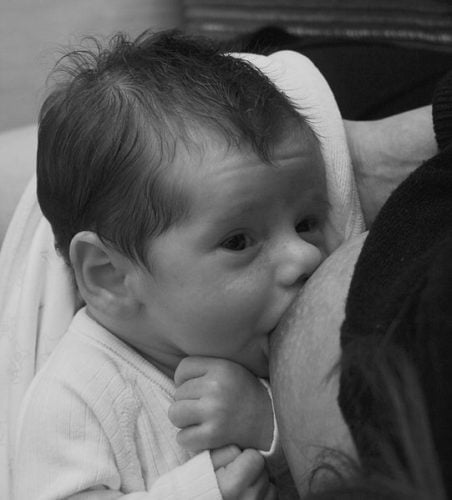Parents, sometimes the first days or weeks of breastfeeding aren’t always easy. Mothers might have significant engorgement about three days after delivery. Some may have none, or engorge later, around four to six weeks postnatal. But why?
In this article:
Before talking about breast engorgement solutions, I would like to define engorgement. There are two types: vascular and late.
Vascular Engorgement
Vascular engorgement refers to the immediate postnatal period, what is often called lactation. But the breast isn’t just engorging with milk. There are three liquids—blood, milk and edema (swelling) around the breast structures.
Swelling causes engorgement. In mammals (because we’re mammals) nature is well made. When a mother gives birth and the placenta is expelled, a message is sent to the brain: “The baby is born, you have to feed it.”
The blood that went to the placenta will flow up to the breast vascularisation. That is why two or three, sometimes five days after delivery, the majority of mothers will feel engorgement. It feels like pressure in the mammary glands, a filling up.
An engorged mother also has redness of the breasts because blood is colouring the skin. And the breasts will become warm because blood heats the body. Why are the veins in a mother’s breast distended, bluish? Because the mammary glands have never contained so much liquid. The blood accumulation allows lactogenesis, milk production. Blood will flow through the blood vessels to the alveoli (milk sac) to manufacture milk and it’s required elements. The milk uses milk ducts to flow into the baby’s mouth when they feed.
Late Engorgement
The second type is late engorgement. It appears around five or six weeks postnatal and involves stagnation of milk in the breasts. There are several possible causes.
- Breastfeeding errors, such as mothers who increase bottle feeding without pumping their milk. You can use a pacifier or give the baby supplements when feeding them while they wait. The breastfeeding periods are further apart, which leads to milk accumulation.

- Blocked milk ducts, which is coagulated milk in the ducts preventing normal milk flow. Sometimes the breasts redden, there is swelling, or a white spot on the nipple tip that is a curdled, coagulated milk plug. A blocked duct is very painful during breastfeeding. The swelling that can occur is discomforting.
- Since mothers produce enough milk for three children but often just have one, there is overproduction. Mothers should breastfeed from one breast at a time to lower the stimulation of neurotransmitters in her breasts. The message is too frequent and production too abundant for her baby’s needs. Even if the baby feeds from both breasts, they never empty them. Stagnant milk accumulates from one feed to another. This can lead to pathological engorgement and infections.
During severe engorgement, the nipples are flat, not erect, which makes it difficult for the baby to take the nipple and increases the mother’s pain.
So you might be wondering what can mothers do if this situation occurs? Good question! If this happens, you have to prevent complications or repeat engorgements. You have to fix basic factors such as
- A proper diet;
- Rest;
- Get help in the home;
- Treat breast wounds.
And to avoid engorgement, you have to regularly empty the breasts.
If you would like hints about engorgement, go to the next entry, Hints for Breast Engorgement.


